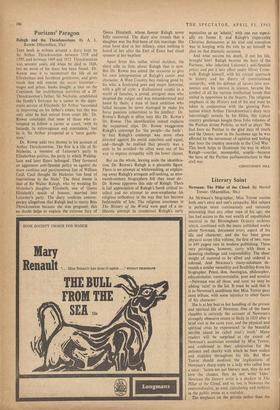Literary Saint
As NEWMAN'S biographer, Miss Trevor excites both one's envy and one's sympathy. Her subject is perhaps more continuously and variously interesting than any other man of his age; she has had access to the vast wealth of unpublished material in the Birmingham Oratory archives which, combined with the many published works about Newman, document every aspect of his life and character; and she has been given physical scope (this volume, the first of two, runs to 649 pages) rare in modern publishing. These very privileges, however, carry with them a daunting challenge and responsibility. The sheer weight of material to be sifted and ordered is colossal. And Newman's many-sidedness de- mands a similar versatility and flexibility from his biographer. Priest, don, theologian, philosopher, educationalist, controversialist, poet and novelist —Newman was all these, and soon we may be adding 'saint' to the list. It must be said that it is to Newman's saintliness that Miss Trevor pays most tribute, with some injustice to other facets of his character.
She is at her best in her handling of the private and spiritual life of Newman. One of the finest chapters is certainly the account of Newman's strangely obsessive return to Sicily in 1833 after a brief visit in the same year, and the physical and spiritual crisis he experienced 'in the beautiful terrible island he called man's tomb.' Many readers will be surprised at the extent of Newman's asceticism revealed by Miss Trevor, and confirmed in their admiration for the patience and charity with which he bore malice and stupidity throughout his life. But Miss Trevor should meditate the implications of Newman's sharp reply to a lady who called him a saint: 'Saints are not literary men, they do not love the classics, they do not write Tales.' Newman the literary artist is a shadow in The Pillar of the Cloud, and so, too, is Newman the controversialist, as cool, calculating and ruthless in the public arena as a matador. The emphasis on the private rather than the
public life of Newman Is apparent in the handling of sources. The location of unpublished material is clearly laid out in an appendix, but the bibliography is scrappy and oddly arranged, and there are no references to published works cited in the text such as the scholar expects in a standard biography. The absence from the book of a discriminating discussion of Newman's earlier work is disappointing. Miss Trevor talks admirable sense about Newman's early dedica- tion to celibacy, for instance, but it is a pity she did not grapple more closely with Geoffrey Faber's theories of homosexual attraction between the young Tractarians. She often speaks of writers who have misunderstood Newman, but they are never specified. Meanwhile, she her- self, over-anxious lest he should continue to be misunderstood, is like an over-possessive mother, forever interrupting her darling to tell us how good he is, while boxing the ears of anyone who dares to breathe a word of criticism.
We must wait for the second volume, Light in Winter, before making a final assessment of the biography, or comparing it with Wilfred Ward's. But I suspect that Miss Trevor will complement rather than supplant Ward, whose expert and lucid exposition of the intellectual and eccle- siastical background to Newman's life is unlikely to be improved on. Hers is a labour of loving scholarship, which deftly disentangles many of the puzzles that have hitherto been found in Newman's life, and has a feeling for the drama of his career and the greatness of his soul. It is, of course, indispensable for anyone interested in Newman. But Newman deserves a great bio- graphy; this is only highly commendable.
DAVID LODGE DAVID LODGE



































 Previous page
Previous page